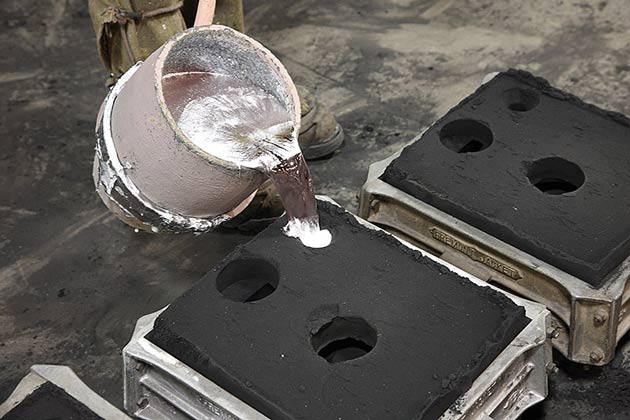Getting My Stahl Specialty Company To Work
Getting My Stahl Specialty Company To Work
Blog Article
10 Easy Facts About Stahl Specialty Company Described
Table of ContentsAll About Stahl Specialty CompanyHow Stahl Specialty Company can Save You Time, Stress, and Money.Facts About Stahl Specialty Company RevealedThe 7-Second Trick For Stahl Specialty CompanyRumored Buzz on Stahl Specialty Company
Chemical Contrast of Cast Light weight aluminum Alloys Silicon promotes castability by decreasing the alloy's melting temperature and improving fluidity during casting. Additionally, silicon contributes to the alloy's stamina and wear resistance, making it important in applications where sturdiness is important, such as automotive parts and engine components.It also boosts the machinability of the alloy, making it less complicated to process right into ended up products. This way, iron adds to the overall workability of light weight aluminum alloys. Copper boosts electrical conductivity, making it advantageous in electrical applications. It likewise boosts rust resistance and contributes to the alloy's overall strength.
Manganese contributes to the toughness of aluminum alloys and boosts workability. It is commonly made use of in wrought light weight aluminum products like sheets, extrusions, and accounts. The existence of manganese help in the alloy's formability and resistance to breaking throughout manufacture procedures. Magnesium is a light-weight element that offers toughness and effect resistance to light weight aluminum alloys.
Zinc improves the castability of light weight aluminum alloys and aids control the solidification process during spreading. It boosts the alloy's toughness and hardness.
What Does Stahl Specialty Company Do?
Since aluminum-silicon alloys have great casting residential properties, high gas buildings, simple procedures, and exceptional rust resistance, aluminum-silicon alloys are most typically utilized in the die-casting market at home and abroad. At the same time, aluminum-silicon alloys are also relatively early and extensively identified alloys established and used in die-casting. After continual research and improvement, the majority of the present international mainstream aluminum-silicon alloys have actually been settled and are nothing greater than A356, A360, A380, ADC12, B390, and A413.
The key thermal conductivity, tensile strength, return stamina, and prolongation differ. Amongst the above alloys, A356 has the highest possible thermal conductivity, and A380 and ADC12 have the most affordable.

Fascination About Stahl Specialty Company
In precision spreading, 6063 is appropriate for applications where intricate geometries and top notch surface coatings are critical. Instances include telecommunication rooms, where the alloy's exceptional formability allows for streamlined and visually pleasing layouts while keeping structural honesty. Similarly, in the Lights Solutions market, precision-cast 6063 components produce elegant and effective lighting components that require elaborate forms and excellent thermal performance.
(https://www.blogtalkradio.com/stahlspecialc)
The A360 shows superior elongation, making it suitable for complex and thin-walled components. In accuracy spreading applications, A360 is fit for markets such as Consumer Electronic Devices, Telecommunication, and Power Devices.

In precision spreading, aluminum 413 beams in the Consumer Electronic Devices and Power Devices markets. It's generally utilized to craft detailed parts like mobile phone housings, video camera bodies, and power device coverings. Its precision is impressive, with tight resistances as much as 0.01 mm, ensuring perfect item assembly. This alloy's remarkable corrosion resistance makes it a superb choice for outside applications, making certain long-lasting, long lasting items in the mentioned markets.
3 Simple Techniques For Stahl Specialty Company
The aluminum alloy you pick will significantly impact both the casting process and the residential or commercial properties of the last product. Due to the fact click for info that of this, you have to make your decision carefully and take an educated approach.
Figuring out the most appropriate light weight aluminum alloy for your application will imply considering a wide array of features. The first group addresses alloy attributes that influence the manufacturing process.
The alloy you pick for die spreading straight affects several aspects of the casting process, like how simple the alloy is to work with and if it is susceptible to casting defects. Warm splitting, also referred to as solidification breaking, is a common die casting flaw for light weight aluminum alloys that can result in internal or surface-level rips or fractures.
Some Known Details About Stahl Specialty Company
Particular light weight aluminum alloys are much more susceptible to warm fracturing than others, and your choice should consider this. Another usual problem discovered in the die casting of light weight aluminum is die soldering, which is when the actors sticks to the die walls and makes ejection difficult. It can harm both the cast and the die, so you need to seek alloys with high anti-soldering homes.
Rust resistance, which is already a remarkable quality of aluminum, can differ significantly from alloy to alloy and is an important particular to think about depending upon the environmental problems your product will be exposed to. Put on resistance is an additional home frequently sought in aluminum items and can distinguish some alloys.
Report this page